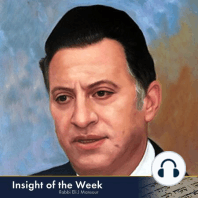20 min listen

Parashat Noah- Teaching With Passion and Conviction
Parashat Noah- Teaching With Passion and Conviction
ratings:
Length:
20 minutes
Released:
Oct 29, 2022
Format:
Podcast episode
Description
The opening verse of Parashat Noah tells us, "Et Ha’Elokim Hit’halech Noah" – that Noah "walked with G-d." The Seforno (Rav Ovadia Seforno, Italy,1474-1550) explains this to mean that Noah dealt kindly with other people, and sought to help them, just as G-d dispenses kindness and helps people. Specifically, the Seforno writes, Noah reprimanded his contemporaries, in an attempt to convince them to cease their evildoing and conduct themselves properly. Whereas many assume that Noah did not try to lead the people of his time to repent, the Seforno claims that Noah indeed expended great efforts seeking to uplift and inspire the sinners of his generation. He followed G-d’s example of kindness by working to help the people of his time improve their behavior. In fact, the Seforno writes later (6:10) that it was only once Noah began reprimanding the people of his time that he was blessed with children. The Torah tells that Noah begot children at the age of 500 – at a much more advanced age than others – and the Seforno maintains that this was because he was granted the blessing of children only after he started making efforts to lead his contemporaries to repent. Of course, as we know, Noah’s efforts were unsuccessful. His teachings had no effect upon the people, and they persisted in their evildoing, until eventually G-d decided to annihilate all of mankind. We might ask, why were his efforts unsuccessful? How is it possible that he was unable to impact anybody? The answer might be that Noah did not truly believe that the sinful people of his time were capable of repenting. In order for a teacher or rabbi to succeed in inspiring those under his charge, he needs to approach his work with conviction, with passion. He needs to believe wholeheartedly everything he says. If he is trying to convince people to change, he needs to believe in his heart that they can change. Noah, it seems, lacked this conviction. He spoke dispassionately, because he doubted whether he could have any impact. He assumed that the people had fallen too low, that they had drifted too far from proper conduct, to ever improve. Noah failed to realize that very often, it is specifically when people hit "rock bottom" that they are open and receptive to calls for change. Many Ba’aleh Teshuba became influenced to embrace religious observance after having fallen to the lowest depths, when their lives became empty and devoid of meaning and substance. When a person reaches this point, he is looking to change – and it is precisely then when one has the greatest chance of influencing that individual and inspiring him to change. The people in Noah’s time were capable of change specifically because they had sunken to such depths, because they had become so evil and debased. But Noah doubted their capacity to change, and so his efforts were tepid and ultimately unsuccessful. We should never doubt a person’s ability to change. No matter where a person is, no matter how distant he might be from G-d, from Torah, and from a Torah lifestyle, he is capable of changing and returning to observance. Once we recognize this truth, and acknowledge the great potential within each and every person, regardless of his current state, we will speak with greater passion and conviction, and will then be able, with G-d’s help, to inspire our fellow Jews to draw closer to Torah observance, one step at a time.
Released:
Oct 29, 2022
Format:
Podcast episode
Titles in the series (25)
Parashat Vaet'Hanan: The Consolation of Shabbat Nahamu: Insights into the Weekly Parasha - Brought to you by itorah.com by Insight of the Week